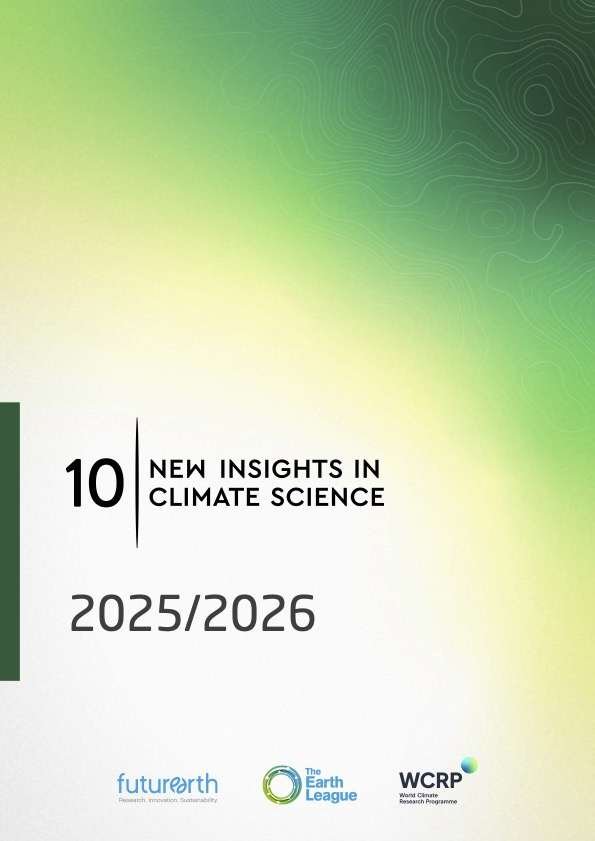Land based carbon sinks are reaching critical limits, heat stress is driving a sharp decline in labor productivity, and rising temperatures are worsening outbreaks of mosquito-borne diseases. These are a few of the latest insights emerging from research that are highlighted in this year’s 10 New Insights in Climate Science report.
A joint initiative of Future Earth, The Earth League, and the World Climate Research Programme, the report synthesizes the most significant advances in climate research over the past 18 months into ten clear takeaways for policymakers.
Launched today by more than 70 globally renowned scientists from 21 countries, the annual reports warns that weaker land sinks, especially forests and soils in the Northern Hemisphere, threaten to derail today’s emissions projections while accelerating global warming.
Even the ocean, another vital sink for carbon and heat, is soaking up less carbon dioxide, while more frequent and intense marine heatwaves ravage ecosystems and coastal livelihoods.
“Our ocean has long buffered the planet from the full force of climate change. But rising emissions and accelerating warming are stretching the capacity of the ocean and land to protect us to its limit,” said Wendy Broadgate, Global Hub Director at Future Earth and a member of the report’s editorial board. “We are witnessing more frequent and severe extreme events around the world. This is why urgent emissions cuts and stopping biodiversity loss aren’t just optional but both are essential for limiting the disastrous effects of climate change.”
The report’s other insights examine the factors contributing to the record warmth of 2023 and 2024, with extreme heat placing unprecedented pressure on freshwater resources, human health and livelihoods.
New research synthesized in the report reveals how rising temperatures are lowering groundwater levels, vital in many regions for agriculture. Climate change is also fueling the spread of mosquito-borne diseases such as dengue fever, as higher temperatures expand the insect’s habitat.

“After witnessing the largest global outbreak of dengue on record last year, health systems are under immense strain,” said Kristie Ebi, a global health professor at the University of Washington and a member of the report’s editorial board. “The findings synthesized in the 10 New Insights report are a stark reminder that no one is immune to the impacts of climate change — its consequences are global, interconnected, and already at our doorstep.”
In addition to human health, the report also explains how heat stress is impacting labor productivity and leading to wider economic instability. For example, just 1°C of warming is expected to expose more than 800 million people in tropical regions to unsafe levels of heat stress, potentially reducing their working hours by as much as 50%.
Ultimately, this year’s report shows that nearly every major climate risk stems from one root cause – the failure to cut emissions at the speed and scale required. The message for COP30 is unequivocal: the science is clear, the solutions and limitations are known, and now is the time to deliver.
This year’s 10 insights are:
- Record warming 2023/24: Evidence on the drivers behind recent global temperature jumps suggests a possible acceleration of global warming.
- Accelerated ocean warming: Rapid ocean warming and intensifying marine heatwaves are harming ecosystems and increasing extreme weather risks.
- Strain on land carbon sinks: Global land carbon sinks are showing signs of stress as the planet continues to warm.
- Climate–biodiversity feedback: Biodiversity loss and climate change reinforce each other in a destabilising loop.
- Declining groundwater levels: Climate change is accelerating groundwater depletion, increasing risks to agriculture and urban settlements.
- Climate-driven dengue outbreaks: Rising temperatures are creating better conditions for the mosquitoes that spread dengue, driving the disease’s geographical spread and intensity.
- Impacts on labour productivity: Increasing heat stress is projected to reduce working hours and economic output.
- Scaling carbon dioxide removal (CDR): Scaling CDR responsibly is essential, but with a focus on hard-to-abate emissions and limiting climate overshoot.
- Carbon market integrity challenges: Strengthening standards and transparency in voluntary carbon markets is needed to ensure real mitigation benefits.
- Effective policy mixes: Carefully designed policy mixes are more effective than single measures in achieving deep and lasting emission cuts.
Additional resources:
Contact
















